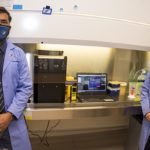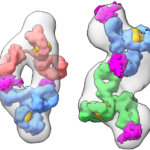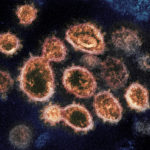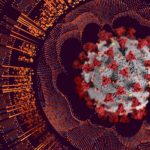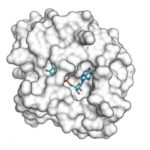Current methods to decontaminate PPE are successful at eradicating the virus but compromise the PPE material, ultimately increasing the wearer’s potential exposure to pathogens. But scientists at the Berkeley Lab, in collaboration with the University of Nevada, Reno (UNR) School of Medicine, have confirmed that a new dry-sanitizing device may provide a safe and reliable solution that doesn’t alter the integrity of the PPE material.
How X-rays Could Make Reliable, Rapid COVID-19 Tests a Reality
An imaging technique pioneered by Berkeley Lab is helping reveal the best antibodies to test for in rapid and reliable COVID-19 detection. Although current tests such as polymerase chain reaction (PCR) are highly accurate, these samples must be sent to an accredited lab for testing, causing a longer wait time for results. Michal Hammel, a research scientist in the Molecular Biophysics and Integrated Bioimaging Division, and Curtis D. Hodge led a study that could help get reliable, self-administered tests with instant results on the market.
Videos Showcase Biosciences’ Response to COVID-19
For the past several months, teams of bioscientists have utilized Berkeley Lab’s world-class research facilities to contribute to the national response to COVID-19, resulting in a wide range of promising research. Four videos showcase researcher contributions from across the Biosciences Area, which aim to help address some of the many scientific challenges posed by the pandemic.
Clues to COVID-19 Treatments Could Be Hiding in Existing Data – These Scientists Want to Find Them
Under a special project launched in May, a Berkeley Lab–led team of computing and bioinformatics experts is developing a platform that consolidates disparate COVID-19 data sources and uses the unified library to make predictions—about potential drug targets, for example.
Building Blocks for COVID-19 Antiviral Drugs Identified in Rapid Study
Members of the UC San Francisco Quantitative Bioscience Institute Coronavirus Research Group (QCRG), in collaboration with Berkeley Lab and SLAC National Accelerator Laboratory (SLAC), have identified key chemical building blocks for an eventual antiviral drug against SARS-CoV-2, the virus that causes COVID-19. The newly identified compounds bind to an enzyme produced by the virus, called the “macro domain,” which is known to be crucial for the virus’s ability to replicate in human cells. The authors are writing up a formal manuscript describing the results for submission to a peer-reviewed academic journal, but also published their data directly online on July 1 to accelerate global efforts to fight the coronavirus pandemic.
Was this page useful?


